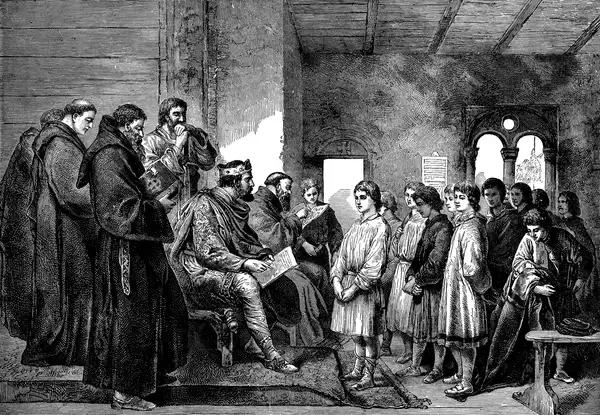What was the importance of literacy and learning to Alfred’s rule?
During Alfred's rule, literacy and learning were crucial for unifying his kingdom and strengthening governance. By promoting education, Alfred aimed to equip his officials with the skills necessary for effective administration and law-making. He believed that understanding Latin and English texts would help in preserving cultural heritage and religious knowledge. Alfred's initiatives in translating important works into English helped foster a sense of shared identity and intellectual growth, laying the foundation for future advancements in English society.

Alfred the Great, the King of Wessex from 871 to 899, is often celebrated for his military prowess and efforts to defend his kingdom against Viking invasions. However, a less discussed yet equally important aspect of his rule was his commitment to ''literacy'' and ''learning''. Alfred recognized that an educated populace was essential for the prosperity and stability of his kingdom. This article delves into the significance of literacy and learning during Alfred's reign, highlighting how these pillars contributed to his legacy and the development of England.
The Context of Alfred’s Reign
During Alfred's time, the British Isles were in a state of turmoil, with constant threats from Viking invaders. In the midst of this chaos, Alfred understood that the strength of his kingdom lay not only in military might but also in the ''intellectual development'' of his people. The ''Anglo-Saxon'' period was characterized by a strong oral tradition, but Alfred sought to promote reading and writing, which he believed were crucial for effective governance and societal advancement.
Promoting Literacy Among the Clergy
One of Alfred's primary focuses was on the education of the clergy. He understood that the church played a pivotal role in society and that educated clergy could better serve their communities. To this end, Alfred established schools and promoted the translation of religious texts from Latin into ''Old English'', making them accessible to a broader audience. This initiative not only improved the literacy rates among the clergy but also ensured that the teachings of Christianity were understood by the laity.
Literacy as a Tool for Governance
Alfred's commitment to literacy also had practical implications for governance. An educated bureaucracy was essential for the administration of justice and the collection of taxes. Alfred implemented reforms that required officials to be literate, ensuring that they could read legal documents and understand the laws they were enforcing. This move helped to create a more efficient and transparent system of governance, fostering trust between the rulers and the ruled.
The Translation Movement
Alfred’s promotion of literacy was particularly evident in his translation efforts. He personally translated several key texts, including the ''Pastoral Care'' by Pope Gregory I and ''Boethius's Consolation of Philosophy''. Through these translations, Alfred not only made important works accessible to his people but also set a precedent for future scholarship. The translation movement that he initiated laid the groundwork for a flourishing literary culture in medieval England.
Literacy and Cultural Identity
Alfred’s emphasis on literacy also contributed to the formation of a distinct ''Anglo-Saxon'' identity. By promoting the use of ''Old English'' in written works, he helped to elevate the language and foster a sense of pride among his subjects. This cultural renaissance was crucial in uniting the various tribes and factions within his kingdom, as a shared language and literary tradition helped to create a cohesive national identity. The revival of literacy during Alfred’s rule can be seen as a foundational moment in the development of English literature and culture.
The Legacy of Alfred’s Educational Reforms
Alfred's educational reforms had long-lasting effects that extended beyond his reign. By prioritizing literacy and learning, he laid the groundwork for future generations to build upon. His initiatives inspired subsequent rulers and scholars, leading to a more educated society in England. The ''Anglo-Saxon Chronicle'', a historical record that emerged during this period, is a testament to the importance placed on literacy and the documentation of history.
The Role of Monasteries
Monasteries became the centers of learning during Alfred’s reign, further emphasizing the importance of literacy. These religious institutions provided education not only to monks but also to laypeople. They preserved and copied texts, ensuring that knowledge was passed down through generations. The monastic schools established during Alfred's time were instrumental in the preservation of classical works and the continuation of learning throughout the Middle Ages.
Conclusion: A Vision for the Future
In conclusion, the importance of literacy and learning to Alfred’s rule cannot be overstated. His vision for an educated society was not just a reflection of his personal values but a strategic move to strengthen his kingdom against external threats and internal discord. By promoting literacy among the clergy, reforming governance, initiating translation efforts, and fostering a sense of cultural identity, Alfred the Great created a legacy that would influence England for centuries to come. The emphasis on education and learning during his reign laid the foundation for the rich literary and cultural heritage that followed, underscoring the profound impact of literacy on the development of a nation.
| Key Areas of Literacy and Learning | Significance |
|---|---|
| Clerical Education | Improved religious understanding and administration. |
| Translation Movement | Increased access to knowledge and cultural works. |
| Governance | Enhanced efficiency and transparency in administration. |
| Cultural Identity | Fostered a shared sense of English heritage. |
| Monastic Centers | Preserved knowledge and provided education. |












